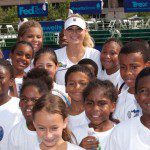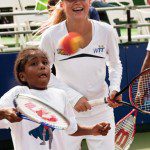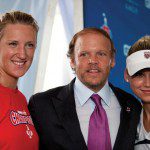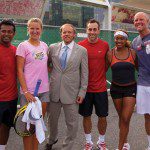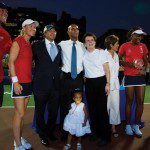The King of the Kastles
By • July 26, 2011 0 1371
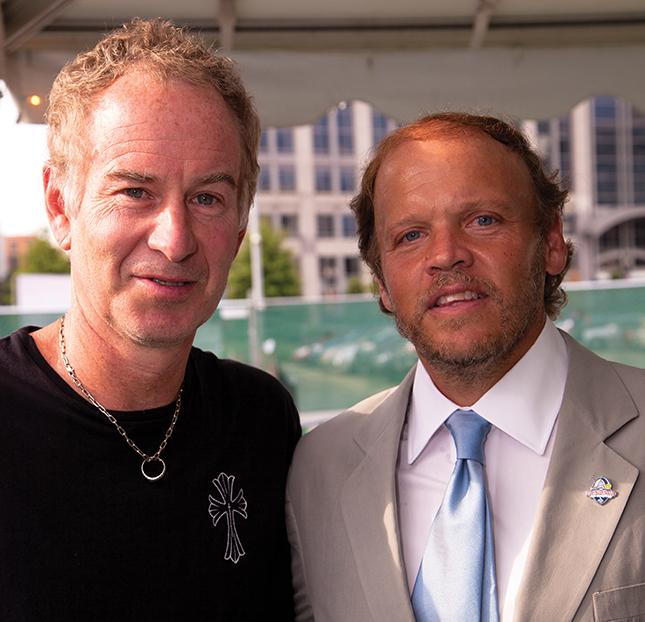
Mark Ein, owner and founder of the Washington Kastles, the District’s World Team Tennis franchise, has brought his love of tennis to the nation’s capital, and in doing so has created a home base for the city’s widespread tennis scene and a center for community development.
When I met Ein at Kastles Stadium during the team’s practice, the metronomic clop of tennis balls washed through the empty arena like a summer shower. The players, preparing for an evening match, lent a pensive aura of determination to the otherwise languid silence of the blistering July morning. The familiar sounds were a comfort, recalling countless hours spent courtside working on my elbowy forehand, being reminded to bend my knees, get my racquet back, and adjust my grip.
Ein can relate to these fundamental tennis foibles, but his game has progressed considerably more than mine ever has — or perhaps ever will. Hitting with the Williams sisters in his inner-city tennis stadium might have helped. “If I wasn’t doing this interview with you,” he says, “I would be out right now doing drills with these guys.”
A successful venture capitalist who grew up around the area and a lifelong tennis player, Ein founded the Washington Kastles as part of World Team Tennis only three years ago. World Team Tennis, started by Billy Jean King, matriarch of professional tennis and advocate for gender equality, is tennis most have never experienced. It is played in a co-ed team format whereby each set is a different combination of opponents. A five-set match covers every combination of players: women’s and men’s singles and doubles, and mixed doubles.
Nor is the etiquette quite in the vein of typical Wimbledonian cordiality. “It’s tennis in a basketball or hockey environment,” Ein says. “We have cheerleaders, mascots. We play music in between the points. And while 3,000 people [the capacity of Kastles Stadium] is actually a pretty good tennis crowd, it feels like three times that number because everyone’s rooting for your team. It’s a very different kind of crowd.”
It’s an environment unique to tennis that allows fans an opportunity to see their favorite players in a more congenial setting. The audience is encouraged to become part of the game, to interact with the players — root for them, even heckle them — and the players can let their own personalities come through. The Williams sisters, John McEnroe, Anna Kournikova, and Andy Roddick are among the national members that bring their game and their voice to the WTT stage.
For the Kastles, Ein has recruited Serena and Venus Williams as the marquee players, and assembled a veritable “who’s who” of all-star teammates, led by coach Murphy Jensen, renowned tennis personality and veteran champ who knows how to balance athletic discipline with the high-profile exposure of this tournament.
However, what makes WTT a unique institution is that, more than just showcasing competitive tennis, the cornerstone of the organization is bringing tennis into the local community, with a history of working with non-profits and charity organizations. “That’s honestly the core of this franchise,” says Ein. “When I started this, I had a mission statement … To expose tennis to a wider audience, create a center of fun activities in the middle of the city during the summer, help local charitable partners, and bring the city together … I never said win a championship. I never said win a match. It really was using this as the catalyst to create this sort of magnet where we could do all kinds of other great things. And that’s really what drives us.”
Ein has partnered with 35 leading charity organizations through the Washington Kastles. Every evening when the Kastles play a home game, between 100 and 300 children are brought to the match for free. Any fans under the age of 16 get a chance to rush the court after the match for autographs from all the members of both teams. Ein and the Kastles give out a thousand tennis racquets over the course of the season at free youth tennis clinics to children who want to learn the game but lack the means or equipment.
The Kastles host nine of these tennis clinics a season, the majority on the stadium courts in the heart of downtown, where the old convention center once stood. However, they sometimes go into the community to host them in rec centers and racquet clubs. The clinics are led by the players themselves — by the Williams sisters, Anna Kournikova or Murphy Jensen. It allows the star athletes to give back to the community and seems as meaningful to them as it is for the children.
“If you talk to Venus and Serena,” says Ein, “one of the reasons they love World Team Tennis is because when they were eight years old they went to a World Team Tennis clinic that Billy Jean King was throwing. They said it changed their lives forever to see Billy and get to meet her and be inspired by her. And so when they come to town, they do the same for inner city kids in Washington. They’ve done that every year they come. They did it again this year.”
Introducing tennis to youth culture is a critical mission of Ein’s, as well as the WTT league. He believes the fundamentals one learns in the game are resounding life lessons. “It’s the sport of a lifetime, not just because you can play your whole life, but because the lessons you learn stick with you in life,” he says. “Tennis is unique because of its individual nature. It teaches you discipline, self-reliance, problem solving — because it’s you against one person within four lines trying to figure it out. It teaches you strategy. It teaches you to think on your feet. It teaches you to be fit. And these are all fantastic lessons that you can apply to anything you do in life, whether it’s business as I’ve done, or anything you decide to do.”
Ein met Billy Jean King just over three years ago at the US Open tournament. After being introduced, the conversation moved quickly in the direction of organizing a World Team Tennis franchise in Washington. King had long desired a WTT team in the nation’s capital, but had never found the right owner. Until Ein came along.
King upholds a few major tenets within the league that inspired Ein in his efforts to spearhead the project: to promote gender equality — WTT is the only professional sports organization where men and women play together on the same team — make tennis accessible in a community atmosphere, expose new players to the sport in an engaging environment, and introduce tennis as a team sport, creating an entirely new dynamic within a well-established, traditional game. Or, as Ein simply states it, “Make it more fun.”
And while the causa causans of World Team Tennis holds steady, make no mistake that this is still among the highest quality professional tennis one will see outside of the majors. The companionship of teammates and a sense of home turf offense, almost unheard of to the solitary tennis champion, motivates players in fresh and unfamiliar ways.
Unlike most tennis tournaments, where players represent only themselves and fans cheer for good points more frequently than an individual, a WTT match really does function more as a baseball game. The home team will have the fans on their side. “Here, people are rooting for your team,” Ein says. “And that really gets people playing.” No one wants to see the visitors win, whether the Colts are trampling the Redskins, or the Washington Kastles are being defeated by the New York Sportimes.
And then there is the added pressure. In a typical tennis match, the pressure is largely internal. But on a WTT team, team pressure can keep a beaten player from giving up. Letting your team down can be far worse than letting yourself down, and this sharpens the players’ focus. It was this very sense of camaraderie that carried the Kastles to the championship last year.
“We were down three championship points,” Ein explains, crouching in, reliving the memory. “Olga [Puchkova] — who won it for us — she hadn’t had the greatest year. And she was playing … one of the best girls in the league, [Vania King]. And every point Murphy [Jensen] was coming out in between and saying, ‘You’re good. We love you. You’re gonna do this, you’re gonna do this.’ And he, like, literally carried her through. I mean, she was unbelievable, but the team really carried her through.”
Only three years after their founding, the Washington Kastles have a championship under their belt. Most matches in the 3,000-seat Kastle Stadium sell out. Ticket sales and sponsorships are by far the highest in the league — three times the league average and 40 percent higher than the second highest team. “It’s truly succeeded my expectations in every respect,” admits a humbled Ein, who attributes the ultimate and holistic success of the Kastles with the thriving state of the Washington tennis community
“I think D.C. is one of the best tennis communities in the United States,” he says. “I was a ball kid at what’s now the Legg Mason … There’s a long history of people supporting tennis.” With 60,000 adults in the Washington region registered with adult team tennis leagues, the District’s tennis scene would appear to be in its golden age.
To an outsider, tennis can seem beside the point, sluggish, even static. On television, the cameras don’t move, and it’s unnervingly quiet save for a few choice grunts and hollow popping sounds. But to those familiar with the game, that small green court with its clean white lines is the projection of interpersonal triumphs, of unresolved grievances. Surely I cannot be the only one to have stood gracelessly at the baseline, lamenting my hopeless serve and envisioning the superhuman potential unlocked by Sampras, Borg or Graf.
But a tennis player also understands that if you take away the stadium seating and the camera crew, those legendary showdowns between Nadal and Federer that seem to have happened in another world entirely, could have happened down the street at the local swim and racquet club.
Mark Ein and the Washington Kastles balance this experience exactly, bringing the Herculean battles of professional tennis stars down to the community level for all to enjoy. It is overwhelming and encouraging, inspiring and daunting all in the same breath. The season may have just ended, but the local Legg Mason tournament and the U.S. Open are just around the corner, and there are plenty of fair-weather months ahead. Now is a great time to pick up a racquet — and maybe start eyeing some season tickets to the Kastles.
Contact the author: ari@georgetowner.com.
- Neshan Naltchayan
- Washington Kastles owner Mark Ein with tennis legend John McEnroe | Jeff Malet



